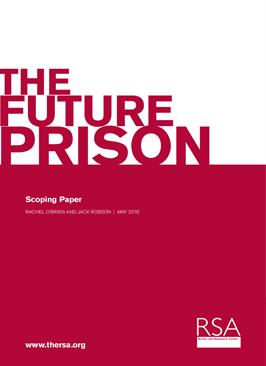Prison reform measures announced in the Queen’s Speech provide an opportunity to place rehabilitation and community engagement squarely at the heart of the prison service.
The RSA welcomes the changes, arguing that the potential for transformational reform requires long-term courage and consistency amongst political leaders. The changes include piloting six ‘reform prisons’, with the aim of giving all prison governors new freedoms to improve rehabilitation and sit alongside the publication of a review of prison education review.
A new RSA and Transitions Spaces paper outlines the scope of a major new project – The Future Prison – that will:
- Set out a blueprint for a future prison that places this challenge of rehabilitation centre stage. This will include exploring the potential for a not-for-profit model.
- Identify what the government needs to do to ensure that the right legislative framework for funding, policy and governance is in place for such approaches to flourish in the short term and be sustained.
The project will explore the potential of autonomy, and even devolution, to drive rehabilitation and reduce risk. Through expert papers, seminars, and fieldwork in prisons, the project will develop proposals for new prison leadership, workforce development and for the role that those inside prison can play in improving outcomes. It argues that robust national leadership, coupled with greater freedoms for governors, could enable prisons to deploy funding and staff where they are most needed, embed innovation, strengthen relationships with local communities and economies, and adapt to local circumstances faster.
The government’s emphasis on rehabilitation – alongside giving governors’ more freedom to do what is needed to support this – has the potential to transform prisons into places of learning and progression and wider community engagement. If prisons are viewed as an end to a process rather than a potential new start, it proves much harder to engage local authorities, employers, the public, let alone staff and those in custody. Yet, effective rehabilitation benefits us all: it make us safer by reducing reoffending but also reduces unemployment, dependence on welfare and wider impacts on families and neighbourhoods. It both requires and drives local buy-in.
The Future Prison project, run by the RSA and Transitions Spaces, a community interest company, will publish a blueprint for future not-for-profit models of provision by the end of 2016. The RSA Future Prison project will publish interim outputs as the project develops with the aim of engaging a wider range of individuals and organisations.
Read the scoping paper online - The Future Prison (via Medium)
Download the Future Prison scoping paper (PDF, 320KB)
Find out more about the Future Prison project
pdf 319 KB
Contributors


